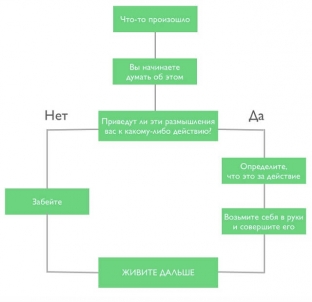During one of his famous speeches, the Indian philosopher Jiddu Krishnamurti asked the audience if they wanted to know his secret. Those present in the hall fell silent and leaned forward. "You know," he said, "I just don't give a damn most of the time." We offer you a translation of an article by the author of the Raptitude blog about why a fly should remain a fly, and an elephant an elephant.
Of course he didn't say that. By most accounts, he said, "You know, I just don't pay attention to what's going on," but he could have said this and that. It seems to me that the not giving a damn concept is closer to the majority. I apologize in advance for the rudeness of this phrase - and I will use it often here - but nothing conveys this truth so well. When you tell someone to "pay no attention," that someone is likely to give you a strange look - but not the one who came to Krishnamurti's lecture. At the same time, everyone understands that sometimes such unpleasant moments happen in life, which are best just to score / spit on. Not to score means to think about what happened. For example, someone is rude to you on the phone, and you replay what happened in your head, you can't give a damn so easily.
If you're worried, it doesn't mean you're doing something useful, although it may seem like it is. It seems quite logical that every time we work on something, we thereby get closer to some kind of answer. But this is not so, because the constant scrolling in the head is a thought process, and a thought process that is not aimed at finding a solution is useless.

We tend to feel that our thoughts serve a function simply because they are triggered by a strong emotion or because they are directed to a subject that is important to us: it may be justice, respect, or the current state of society.
No. Thinking is only meaningful if it gets your body moving and doing something useful. This does not mean that any life chagrin, rudeness or injustice must be immediately responded to with action. Quite the opposite. Usually there is nothing you can do about it or you just don't want to do it. And that's okay. In most cases, it's better to do nothing at all, just to score.
Such a concept may seem apathetic. Actually it is not. It is simply a refusal to waste your energy and time on thoughts that will not lead to anything. So if you decide to go crazy over something, make sure that it will lead to some kind of response to what happened, and then move on to action. Here is a visual scheme of actions.

There have been times in my life when I would have wasted an enormous amount of energy worrying about such injustices. But that day, I wasn't going to do it, and it passed me by. I still felt the initial surge of rage and adrenaline, but decided to just skip this five second event rather than reflect on it for another half day and then tell everyone about it.
I continued to run and noticed that just a few seconds later the street was quiet and peaceful again. There was not the slightest trace of what happened, just because I didn't bring it to life in my head, I didn't give a damn about it.
I have known people who have told entire stories, more than once, about some not-so-pleasant twenty-second incident that happened to them many years ago and which they cannot possibly forget. I think you also met such people. Don't fall into the same madness. Follow the chosen course: just shoot it.
The ability to score on time does not mean that you will always score on everything. It only means that you are doing it consciously. You have a reason. The main thing is to catch yourself in the response. It all starts with anger and outrage in your head, usually in the form of a witty response or an internal sermon about decency and respect. You can start running through several possible scenarios in which you show the abuser who is in charge. It's also very easy to get caught up in a vengeful fantasy where (for example) you're like a tank/Terminator rushing after a truck, causing it to end up crashing into a tree and you're standing there laughing and patting your sides.
When you find yourself thinking like this, remind yourself that you don't really care about such things, and turn your full attention back to the material world. What was your next plan after this pitifully small incident happened? Listen to your body: what does it need to move on?
So hang up. Dial the next number, run another mile, mix your drinks, jump on your bike... everything that logically follows in the life of a person who does not pay attention to the little things in life. And if you can’t wait to think about something once again, then you better think about it.






Add a comment